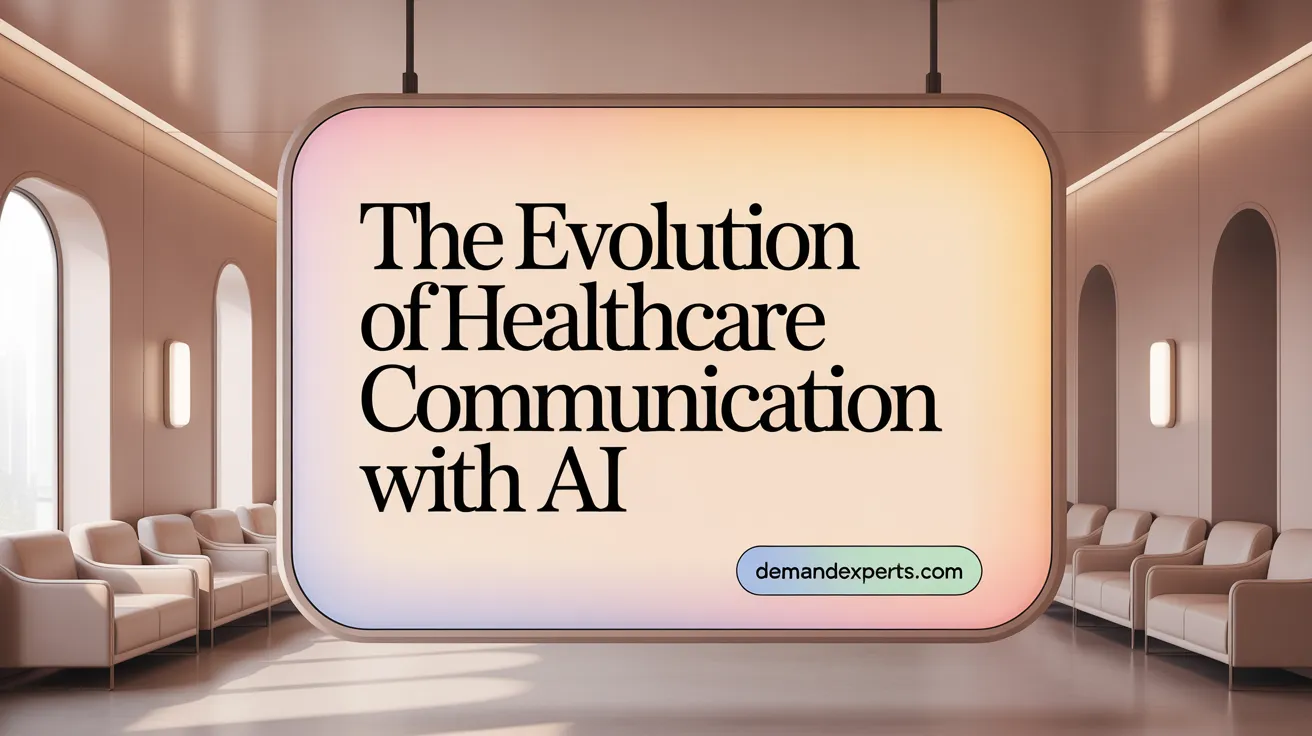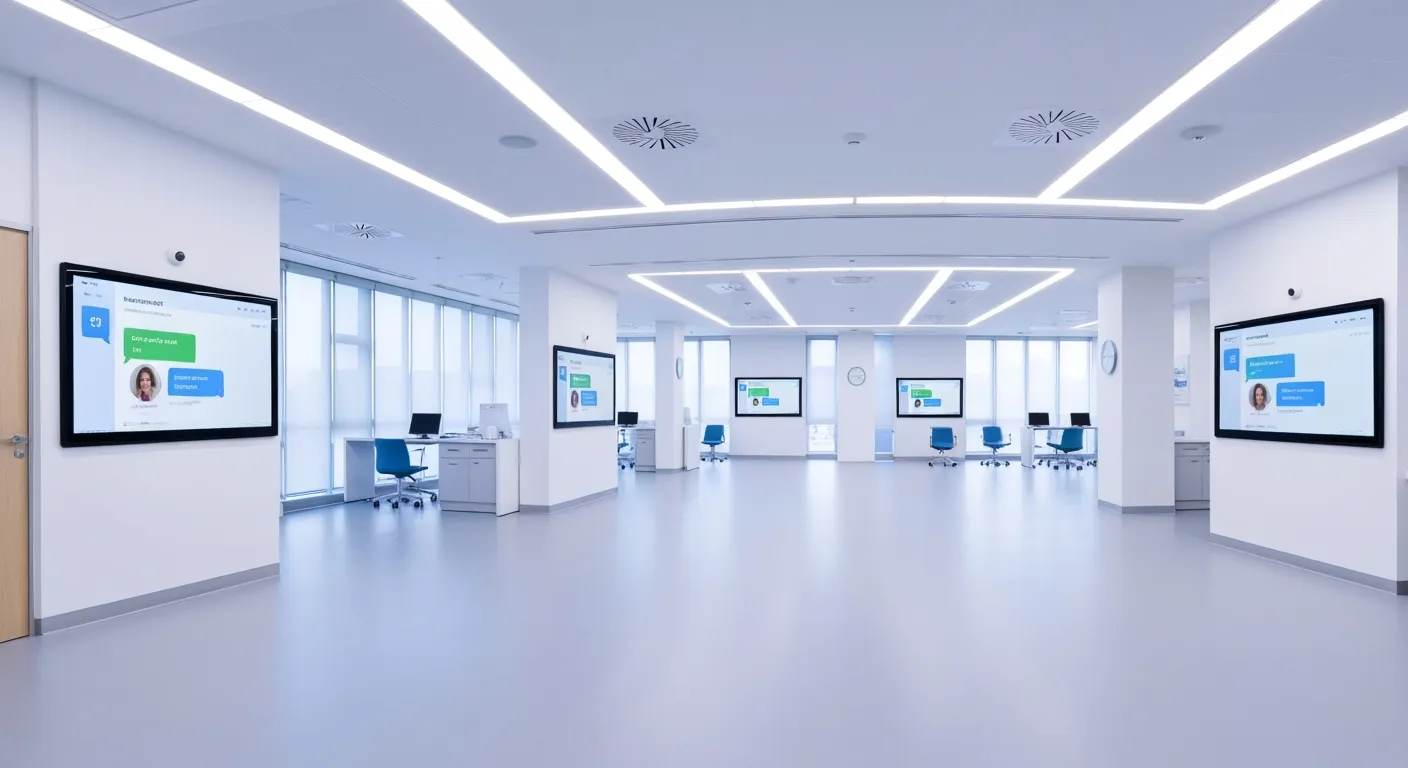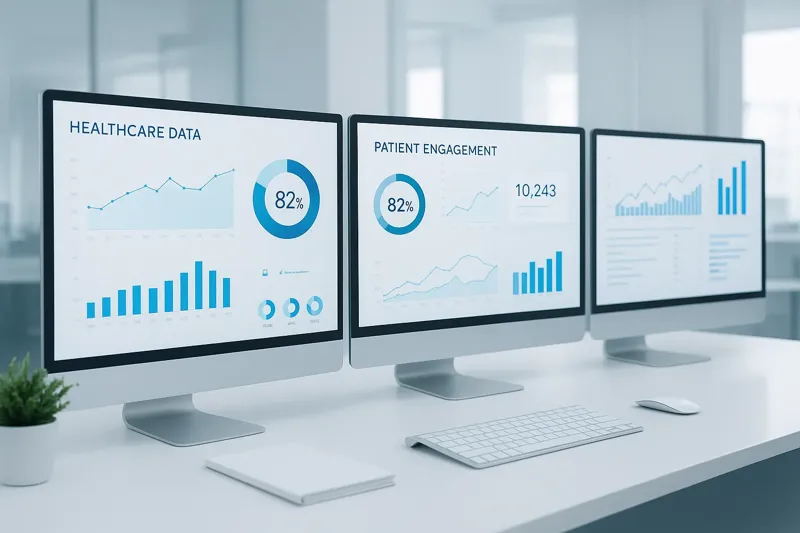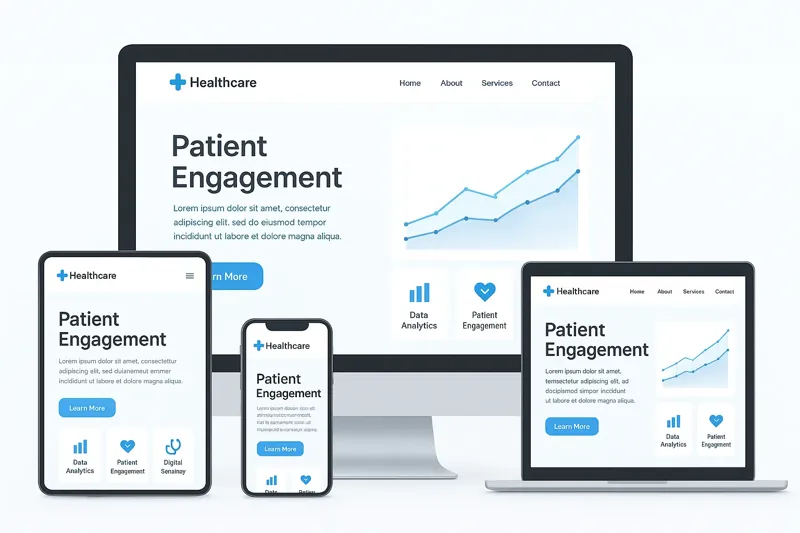Transforming Patient Engagement Through Technology
The integration of AI-powered live chat tools is reshaping how healthcare providers interact with patients. By combining the capabilities of conversational AI with live support, healthcare systems enhance accessibility, responsiveness, and personalization in patient communication. This article explores the benefits, implementation strategies, and challenges of deploying AI live chat solutions, highlighting their role in boosting patient interaction and improving healthcare delivery.
The Evolution of AI in Healthcare Communication

How are AI chatbots improving patient communication in healthcare?
AI chatbots and virtual assistants have become transformative tools in healthcare communication. Utilizing advanced natural language understanding chatbots and machine learning technologies, these systems understand and respond to patient queries in real time. They provide 24/7 support by assisting with appointment scheduling, symptom triage, medication reminders, and educational content delivery. This continuous accessibility reduces patient wait times and streamlines administrative tasks, enhancing both patient engagement and access to care. Additionally, AI chatbots improve operational efficiency by managing high patient volumes without increasing staff burdens (AI chatbots in healthcare).
What technologies power AI live chat tools in healthcare?
The core technologies behind AI live chat in healthcare include natural language processing, which involves both natural language understanding and natural language generation to interpret and craft responses. Machine learning algorithms enable chatbots to learn from interactions and improve over time. Sentiment analysis helps the system detect emotional context, while specialized speech recognition adapts to complex medical jargon and noisy clinical environments. Cloud computing supports scalability and integration with healthcare systems, allowing chatbots to handle complex, multilingual queries and maintain data security and compliance with privacy standards.
Growth and market projections of healthcare chatbots
The healthcare chatbot market is rapidly expanding, with projections estimating a value of USD 1.49 billion by 2025 and soaring to over USD 10 billion by 2034 (AI chatbots in healthcare). This growth underscores the increasing adoption of AI-powered chatbots for enhancing patient communication, operational efficiency, and cost savings. Presently, approximately 19% of US medical group practices have integrated chatbots or virtual assistants, signaling widespread recognition of their benefits (AI chatbot benefits in healthcare).
Examples of AI-powered chat applications in patient engagement
Several healthcare institutions and platforms exemplify effective use of AI chatbots. For instance, OSF HealthCare's virtual assistant Clare handles symptom checking, appointment scheduling, and live nurse chats, with nearly half of interactions occurring outside business hours. Northwell Health employs custom chatbots for symptom tracking and care escalation, reducing hospital readmissions (Northwell Health chatbot use case. Boston Children's Hospital developed KidsMD to aid parents in scheduling based on symptoms, while Walgreens leverages chatbots to improve medication adherence. These cases highlight the diverse applications and patient engagement enhancements afforded by AI chat technologies (AI chatbots for patient engagement).
Enhancing Patient Access and Experience with AI Live Chat

What benefits do AI live chat solutions offer patients?
AI live chat platforms ensure patients have 24/7 access to crucial healthcare services outside traditional hours. These tools support appointment scheduling, symptom checking, medication reminders, bill payments, and even answers to frequently asked questions. They engage patients personally by tailoring messages and follow-ups to individual preferences, which boosts adherence to treatment plans. By providing instant responses, AI live chat minimizes waiting times and enhances the overall patient experience. Learn more about AI Live Chat Customer Support and AI chatbots in healthcare.
How do AI chatbots improve healthcare operational efficiency?
AI chatbots automate routine and repetitive tasks such as appointment bookings, patient triage, answering common inquiries, and sending reminders. This automation reduces call center volume substantially, sometimes by up to 50%, lowering administrative burdens on healthcare staff. The resulting operational cost savings are significant, with projections estimating global reductions of $3.6 billion by 2025. Freed from routine tasks, clinicians can dedicate more time to complex patient care, improving healthcare quality and efficiency. For more details, see AI chatbots boost patient engagement and reduce clinician workload and 10 benefits of AI in healthcare.
Personalization and patient adherence support
Advanced AI live chat solutions utilize natural language processing and machine learning to remember patient preferences and health history. They provide real-time reminders for medication and appointments while offering explanations that help patients understand their care plans better. This personalized approach fosters higher rates of adherence — some systems report adherence rates up to 97% — and increased patient retention and satisfaction. Explore more on AI chatbots and patient adherence and Implementing AI chatbots safely.
Integration with existing healthcare systems
AI live chat tools seamlessly integrate with electronic health records (EHRs), patient portals, telemedicine platforms, billing systems, and digital health devices. This integration creates unified communication channels allowing chatbots to access and update patient information in real-time, improving accuracy and personalization. Such interoperability enhances clinical workflows, enabling AI chatbots to handle complex queries confidently and ensuring coherent patient care. Read more about integration with healthcare systems and AI-powered contact center solutions.
Implementing AI-Powered Live Chat: Best Practices and Challenges

What are key considerations for successful AI live chat implementation in healthcare?
Seamless integration with electronic health records (EMRs) and other existing healthcare platforms is crucial. This integration enables AI chatbots to access real-time patient data, appointment schedules, and medical history, offering personalized and accurate responses. Customizing and training the AI models with relevant datasets such as past chat histories, medical FAQs, and clinical guidelines improve chatbot performance and ensure responses are contextually appropriate (AI-powered contact center solutions, AI chatbots in healthcare.
Managing privacy and maintaining HIPAA compliance is a top priority. Encryption standards and strict data access controls must be in place. Patients should be transparently informed about interacting with AI, with clear options to switch to human agents when needed. This human oversight preserves trust and patient safety (AI chatbots in remote patient monitoring, AI-powered contact center solutions).
What challenges do healthcare providers face when adopting AI chatbots?
Healthcare providers face several challenges while deploying AI chatbots. Ensuring patient safety by avoiding misinformation and inaccurate medical advice is vital. Algorithmic biases must be addressed to prevent inequities. Transparency about chatbot capabilities and limitations helps manage expectations (Implementing AI chatbots safely, Avoiding misinformation in AI chatbots, Addressing bias in healthcare chatbots).
Resistance from both clinicians and patients poses a challenge, often due to concerns around reduced human interaction and loss of empathy. Balancing automation with meaningful human engagement is key to patient satisfaction (Balancing automation and human connection in healthcare chat).
Technical challenges include scalability, handling complex queries, and securing sensitive health data from breaches. Continuous monitoring and updating of AI systems are required to maintain reliability and compliance with health regulations (AI in healthcare, Chatbots for scheduling appointments.
By focusing on these considerations and overcoming challenges, healthcare organizations can leverage AI-powered live chat to enhance patient access, improve operational efficiency, and maintain high-quality, secure patient interactions (Enhancing patient access with chatbots, Benefits of AI in Health Care).
AI Live Chat Improving Quality of Patient Communication

How can AI-powered live chat maintain empathy and connection in patient interactions?
AI-powered live chat systems support patient communication by automating routine queries and enabling 24/7 accessibility. However, they do not replace human empathy. Trained live chat agents take over complex or emotionally charged conversations, applying skills like active listening techniques and cultural competence. AI assists by suggesting empathetic responses and summarizing discussion points in real time, fostering patient trust and satisfaction. Learn more about AI in Live Chat and Effective live chat strategies.
What strategies improve difficult patient interactions in live chat?
Effective management of challenging live chat conversations includes:
- Establishing clear communication protocols and boundaries to maintain professionalism.
- Employing active listening to detect emotions such as frustration or anxiety.
- Responding patiently and respectfully to build rapport.
- Providing continuous training and simulations to prepare healthcare staff for digital interactions where non-verbal cues are absent.
These approaches help de-escalate tension and promote a constructive atmosphere despite the limitations of virtual communication. For best practices in Active listening techniques and Managing difficult patient interactions.
Training healthcare staff for effective chat communication
Healthcare staff receive specialized training focused on:
- Crafting clear, empathetic written communication tailored to diverse patient backgrounds.
- Managing confidentiality and adhering to HIPAA regulations.
- Utilizing digital tools efficiently, including AI support features.
This preparation ensures quality interactions that address patients’ emotional and clinical needs digitally. Explore resources on Effective patient communication techniques and HIPAA compliance for live chat solutions.
Monitoring and improving service quality
Organizations monitor key performance indicators such as response times, resolution rates, and patient satisfaction scores to assess live chat effectiveness. Patient feedback is actively gathered and used to refine training, upgrade technology, and enhance chatbot integration. These continuous improvements help maintain high standards and optimize patient engagement. Further information on Monitoring live chat KPIs and AI Live Chat Data Insights is available.
Impact on Chronic Disease Management and Remote Monitoring
In what ways do AI live chat tools support chronic disease management?
AI-powered chatbots play a significant role in chronic disease management by offering features such as real-time reminders for chronic condition patients and detailed explanations of complex medication regimens. They monitor symptoms continuously and provide therapeutic support, increasing patient engagement and improving adherence to care plans. Engagement rates with these systems have been shown to exceed 90%, while adherence rates can reach as high as 97%, demonstrating their effectiveness in helping patients manage long-term conditions.
These chatbots often serve as virtual assistants that demystify medical instructions with AI and send timely alerts, which is especially beneficial for patients managing multiple medications or fluctuating symptoms. Their availability 24/7 ensures patients receive support whenever needed, improving overall disease management outcomes.
How does AI live chat help manage healthcare resources in chronic care?
AI chatbots automate many routine interactions and monitoring tasks, significantly reducing the workload of clinicians and other healthcare staff. By handling scheduling, symptom checks, and follow-ups, these systems free healthcare professionals to focus on more complex patient needs. This automation enables healthcare providers to manage larger patient populations efficiently without a proportional increase in staff.
Moreover, this scalability helps healthcare systems to remain sustainable, especially as remote patient monitoring gains popularity. AI tools ensure consistent quality of care while optimizing resource allocation. Integration with existing electronic health records and telemedicine platforms further streamlines workflows and enhances the delivery of chronic care.
The scalability, continuous availability, and intelligent monitoring offered by AI live chat tools help improve access to care, particularly for patients in remote or underserved areas, closing gaps in healthcare delivery.
The Role of AI in Telehealth and Virtual Healthcare Extensions
Integration of AI chatbots with telehealth platforms
AI-powered chatbots are increasingly integrated into telehealth platforms and AI chatbots in healthcare, enhancing virtual healthcare delivery by automating routine tasks such as appointment scheduling, symptom triage, and initial patient data collection. This integration allows healthcare providers to manage high patient volumes effectively and improves workflow efficiency by handling basic inquiries and administrative functions.
Facilitating remote consultations and follow-up
By collecting preliminary health information and supporting real-time communication, AI live chat tools and AI Live Chat complement telehealth services by streamlining remote consultations. They facilitate timely follow-up interactions and monitoring, ensuring patients receive continuous care even outside traditional clinic hours. This ongoing support improves patient adherence to care plans and enables clinicians to focus on complex cases.
Overcoming barriers of distance and accessibility
Telehealth, combined with AI chatbots, addresses challenges related to geographical distance and limited healthcare access. AI-driven virtual assistants enable patients—especially those in remote or underserved areas—to access medical advice and services 24/7 without the need for travel. This reduces healthcare disparities and minimizes the strain on physical healthcare facilities. Learn more about the telehealth benefits and challenges and telehealth increasing healthcare access.
Enhancing mental health support via chat
AI-powered chatbots provide unique benefits in mental healthcare by offering anonymous and constant support for individuals facing anxiety, depression, or other mental health challenges. Using sentiment analysis and natural language processing, chatbots detect emotional cues early, delivering personalized coaching and crisis intervention. This helps patients who might hesitate to seek in-person care due to stigma or accessibility concerns.
How do AI live chat tools complement telehealth services?
AI chatbots streamline telehealth workflows by handling appointment scheduling, patient triage, and collecting preliminary health information before virtual visits. They enable continuous monitoring and provide timely follow-up support, increasing access for patients unable to attend in-person appointments and improving telehealth efficiency. Discover more about AI live chat integration in healthcare and how AI integration enhances live chat in healthcare.
What unique benefits do AI-powered chat provide in mental health care?
AI chatbots offer anonymous, around-the-clock support for mental health concerns, facilitate early detection of anxiety and depression through sentiment analysis, and provide personalized coaching and crisis intervention. This supports patients who may be reluctant to seek in-person care due to stigma or accessibility issues. Explore AI chatbots in mental health care and the benefits of conversational AI in healthcare for detailed insights.
Future Directions and Ethical Considerations in AI-Enhanced Patient Interaction

What are the future trends in AI-powered live chat for healthcare?
The future of AI-powered live chat in healthcare is marked by significant advancements in generative AI and conversational technologies. These tools will become more adaptive and capable of natural, human-like interactions, enhancing patient engagement. Innovations include emotional intelligence features that recognize patient sentiments, multilingual support to serve diverse populations, and proactive health coaching that anticipates patient needs. Integration with Internet of Things (IoT) devices will enable continuous health monitoring, providing predictive analytics to support personalized, real-time care outside traditional clinical settings.
What ethical and regulatory challenges accompany AI chatbots in healthcare?
Implementing AI chatbots in healthcare presents important ethical and regulatory challenges. Ensuring patient privacy and data security is paramount, with strict adherence to regulations such as HIPAA and GDPR. AI developers must address biases embedded in algorithms to promote equity and avoid disparities in care. Transparency is critical; patients should understand when they are interacting with AI and the scope of its capabilities. Maintaining patient autonomy by allowing easy access to human clinicians and clear options to opt out of automated services safeguards trust. Preventing the spread of misinformation through accurate, frequently updated medical content is essential to patient safety.
Balancing automation with human oversight
While automation enhances efficiency and access, human oversight remains indispensable for clinical accuracy and compassion. AI chatbots are best implemented as supportive tools that handle routine communication, freeing clinicians to focus on complex and sensitive care. Transparent communication about the chatbot’s role and incorporating clinician review where needed protect against errors and foster patient confidence. Hybrid models that blend AI efficiency with personal human connection optimize outcomes and uphold ethical standards.
Anticipated growth and evolving use cases
The healthcare AI chatbots market is rapidly expanding, projected to reach billions within the next decade. As these tools evolve, their applications will grow beyond appointment scheduling and symptom triage to include chronic disease management, mental health support, personalized education, and integration into telehealth platforms. Emphasis on secure, scalable, and patient-centered design will drive adoption. The future will also include broader use of conversational AI to improve health literacy, support decision-making, and enhance the overall patient experience.
Embracing AI Live Chat for Enhanced Patient Engagement
AI-powered live chat tools represent a transformative advancement in healthcare communication, offering patients greater access, personalized support, and timely information while easing strain on clinical resources. By thoughtfully integrating AI with human oversight and maintaining ethical standards, healthcare organizations can significantly improve patient experiences and outcomes. As technology evolves, AI live chat will play an increasingly vital role in delivering efficient, empathetic, and equitable care.
Transforming Patient Engagement Through Technology
The integration of AI-powered live chat tools is reshaping how healthcare providers interact with patients. By combining the capabilities of conversational AI with live support, healthcare systems enhance accessibility, responsiveness, and personalization in patient communication. This article explores the benefits, implementation strategies, and challenges of deploying AI live chat solutions, highlighting their role in boosting patient interaction and improving healthcare delivery.
The Evolution of AI in Healthcare Communication

How are AI chatbots improving patient communication in healthcare?
AI chatbots and virtual assistants have become transformative tools in healthcare communication. Utilizing advanced natural language understanding chatbots and machine learning technologies, these systems understand and respond to patient queries in real time. They provide 24/7 support by assisting with appointment scheduling, symptom triage, medication reminders, and educational content delivery. This continuous accessibility reduces patient wait times and streamlines administrative tasks, enhancing both patient engagement and access to care. Additionally, AI chatbots improve operational efficiency by managing high patient volumes without increasing staff burdens (AI chatbots in healthcare).
What technologies power AI live chat tools in healthcare?
The core technologies behind AI live chat in healthcare include natural language processing, which involves both natural language understanding and natural language generation to interpret and craft responses. Machine learning algorithms enable chatbots to learn from interactions and improve over time. Sentiment analysis helps the system detect emotional context, while specialized speech recognition adapts to complex medical jargon and noisy clinical environments. Cloud computing supports scalability and integration with healthcare systems, allowing chatbots to handle complex, multilingual queries and maintain data security and compliance with privacy standards.
Growth and market projections of healthcare chatbots
The healthcare chatbot market is rapidly expanding, with projections estimating a value of USD 1.49 billion by 2025 and soaring to over USD 10 billion by 2034 (AI chatbots in healthcare). This growth underscores the increasing adoption of AI-powered chatbots for enhancing patient communication, operational efficiency, and cost savings. Presently, approximately 19% of US medical group practices have integrated chatbots or virtual assistants, signaling widespread recognition of their benefits (AI chatbot benefits in healthcare).
Examples of AI-powered chat applications in patient engagement
Several healthcare institutions and platforms exemplify effective use of AI chatbots. For instance, OSF HealthCare's virtual assistant Clare handles symptom checking, appointment scheduling, and live nurse chats, with nearly half of interactions occurring outside business hours. Northwell Health employs custom chatbots for symptom tracking and care escalation, reducing hospital readmissions (Northwell Health chatbot use case. Boston Children's Hospital developed KidsMD to aid parents in scheduling based on symptoms, while Walgreens leverages chatbots to improve medication adherence. These cases highlight the diverse applications and patient engagement enhancements afforded by AI chat technologies (AI chatbots for patient engagement).
Enhancing Patient Access and Experience with AI Live Chat

What benefits do AI live chat solutions offer patients?
AI live chat platforms ensure patients have 24/7 access to crucial healthcare services outside traditional hours. These tools support appointment scheduling, symptom checking, medication reminders, bill payments, and even answers to frequently asked questions. They engage patients personally by tailoring messages and follow-ups to individual preferences, which boosts adherence to treatment plans. By providing instant responses, AI live chat minimizes waiting times and enhances the overall patient experience. Learn more about AI Live Chat Customer Support and AI chatbots in healthcare.
How do AI chatbots improve healthcare operational efficiency?
AI chatbots automate routine and repetitive tasks such as appointment bookings, patient triage, answering common inquiries, and sending reminders. This automation reduces call center volume substantially, sometimes by up to 50%, lowering administrative burdens on healthcare staff. The resulting operational cost savings are significant, with projections estimating global reductions of $3.6 billion by 2025. Freed from routine tasks, clinicians can dedicate more time to complex patient care, improving healthcare quality and efficiency. For more details, see AI chatbots boost patient engagement and reduce clinician workload and 10 benefits of AI in healthcare.
Personalization and patient adherence support
Advanced AI live chat solutions utilize natural language processing and machine learning to remember patient preferences and health history. They provide real-time reminders for medication and appointments while offering explanations that help patients understand their care plans better. This personalized approach fosters higher rates of adherence — some systems report adherence rates up to 97% — and increased patient retention and satisfaction. Explore more on AI chatbots and patient adherence and Implementing AI chatbots safely.
Integration with existing healthcare systems
AI live chat tools seamlessly integrate with electronic health records (EHRs), patient portals, telemedicine platforms, billing systems, and digital health devices. This integration creates unified communication channels allowing chatbots to access and update patient information in real-time, improving accuracy and personalization. Such interoperability enhances clinical workflows, enabling AI chatbots to handle complex queries confidently and ensuring coherent patient care. Read more about integration with healthcare systems and AI-powered contact center solutions.
Implementing AI-Powered Live Chat: Best Practices and Challenges

What are key considerations for successful AI live chat implementation in healthcare?
Seamless integration with electronic health records (EMRs) and other existing healthcare platforms is crucial. This integration enables AI chatbots to access real-time patient data, appointment schedules, and medical history, offering personalized and accurate responses. Customizing and training the AI models with relevant datasets such as past chat histories, medical FAQs, and clinical guidelines improve chatbot performance and ensure responses are contextually appropriate (AI-powered contact center solutions, AI chatbots in healthcare.
Managing privacy and maintaining HIPAA compliance is a top priority. Encryption standards and strict data access controls must be in place. Patients should be transparently informed about interacting with AI, with clear options to switch to human agents when needed. This human oversight preserves trust and patient safety (AI chatbots in remote patient monitoring, AI-powered contact center solutions).
What challenges do healthcare providers face when adopting AI chatbots?
Healthcare providers face several challenges while deploying AI chatbots. Ensuring patient safety by avoiding misinformation and inaccurate medical advice is vital. Algorithmic biases must be addressed to prevent inequities. Transparency about chatbot capabilities and limitations helps manage expectations (Implementing AI chatbots safely, Avoiding misinformation in AI chatbots, Addressing bias in healthcare chatbots).
Resistance from both clinicians and patients poses a challenge, often due to concerns around reduced human interaction and loss of empathy. Balancing automation with meaningful human engagement is key to patient satisfaction (Balancing automation and human connection in healthcare chat).
Technical challenges include scalability, handling complex queries, and securing sensitive health data from breaches. Continuous monitoring and updating of AI systems are required to maintain reliability and compliance with health regulations (AI in healthcare, Chatbots for scheduling appointments.
By focusing on these considerations and overcoming challenges, healthcare organizations can leverage AI-powered live chat to enhance patient access, improve operational efficiency, and maintain high-quality, secure patient interactions (Enhancing patient access with chatbots, Benefits of AI in Health Care).
AI Live Chat Improving Quality of Patient Communication

How can AI-powered live chat maintain empathy and connection in patient interactions?
AI-powered live chat systems support patient communication by automating routine queries and enabling 24/7 accessibility. However, they do not replace human empathy. Trained live chat agents take over complex or emotionally charged conversations, applying skills like active listening techniques and cultural competence. AI assists by suggesting empathetic responses and summarizing discussion points in real time, fostering patient trust and satisfaction. Learn more about AI in Live Chat and Effective live chat strategies.
What strategies improve difficult patient interactions in live chat?
Effective management of challenging live chat conversations includes:
- Establishing clear communication protocols and boundaries to maintain professionalism.
- Employing active listening to detect emotions such as frustration or anxiety.
- Responding patiently and respectfully to build rapport.
- Providing continuous training and simulations to prepare healthcare staff for digital interactions where non-verbal cues are absent.
These approaches help de-escalate tension and promote a constructive atmosphere despite the limitations of virtual communication. For best practices in Active listening techniques and Managing difficult patient interactions.
Training healthcare staff for effective chat communication
Healthcare staff receive specialized training focused on:
- Crafting clear, empathetic written communication tailored to diverse patient backgrounds.
- Managing confidentiality and adhering to HIPAA regulations.
- Utilizing digital tools efficiently, including AI support features.
This preparation ensures quality interactions that address patients’ emotional and clinical needs digitally. Explore resources on Effective patient communication techniques and HIPAA compliance for live chat solutions.
Monitoring and improving service quality
Organizations monitor key performance indicators such as response times, resolution rates, and patient satisfaction scores to assess live chat effectiveness. Patient feedback is actively gathered and used to refine training, upgrade technology, and enhance chatbot integration. These continuous improvements help maintain high standards and optimize patient engagement. Further information on Monitoring live chat KPIs and AI Live Chat Data Insights is available.
Impact on Chronic Disease Management and Remote Monitoring
In what ways do AI live chat tools support chronic disease management?
AI-powered chatbots play a significant role in chronic disease management by offering features such as real-time reminders for chronic condition patients and detailed explanations of complex medication regimens. They monitor symptoms continuously and provide therapeutic support, increasing patient engagement and improving adherence to care plans. Engagement rates with these systems have been shown to exceed 90%, while adherence rates can reach as high as 97%, demonstrating their effectiveness in helping patients manage long-term conditions.
These chatbots often serve as virtual assistants that demystify medical instructions with AI and send timely alerts, which is especially beneficial for patients managing multiple medications or fluctuating symptoms. Their availability 24/7 ensures patients receive support whenever needed, improving overall disease management outcomes.
How does AI live chat help manage healthcare resources in chronic care?
AI chatbots automate many routine interactions and monitoring tasks, significantly reducing the workload of clinicians and other healthcare staff. By handling scheduling, symptom checks, and follow-ups, these systems free healthcare professionals to focus on more complex patient needs. This automation enables healthcare providers to manage larger patient populations efficiently without a proportional increase in staff.
Moreover, this scalability helps healthcare systems to remain sustainable, especially as remote patient monitoring gains popularity. AI tools ensure consistent quality of care while optimizing resource allocation. Integration with existing electronic health records and telemedicine platforms further streamlines workflows and enhances the delivery of chronic care.
The scalability, continuous availability, and intelligent monitoring offered by AI live chat tools help improve access to care, particularly for patients in remote or underserved areas, closing gaps in healthcare delivery.
The Role of AI in Telehealth and Virtual Healthcare Extensions
Integration of AI chatbots with telehealth platforms
AI-powered chatbots are increasingly integrated into telehealth platforms and AI chatbots in healthcare, enhancing virtual healthcare delivery by automating routine tasks such as appointment scheduling, symptom triage, and initial patient data collection. This integration allows healthcare providers to manage high patient volumes effectively and improves workflow efficiency by handling basic inquiries and administrative functions.
Facilitating remote consultations and follow-up
By collecting preliminary health information and supporting real-time communication, AI live chat tools and AI Live Chat complement telehealth services by streamlining remote consultations. They facilitate timely follow-up interactions and monitoring, ensuring patients receive continuous care even outside traditional clinic hours. This ongoing support improves patient adherence to care plans and enables clinicians to focus on complex cases.
Overcoming barriers of distance and accessibility
Telehealth, combined with AI chatbots, addresses challenges related to geographical distance and limited healthcare access. AI-driven virtual assistants enable patients—especially those in remote or underserved areas—to access medical advice and services 24/7 without the need for travel. This reduces healthcare disparities and minimizes the strain on physical healthcare facilities. Learn more about the telehealth benefits and challenges and telehealth increasing healthcare access.
Enhancing mental health support via chat
AI-powered chatbots provide unique benefits in mental healthcare by offering anonymous and constant support for individuals facing anxiety, depression, or other mental health challenges. Using sentiment analysis and natural language processing, chatbots detect emotional cues early, delivering personalized coaching and crisis intervention. This helps patients who might hesitate to seek in-person care due to stigma or accessibility concerns.
How do AI live chat tools complement telehealth services?
AI chatbots streamline telehealth workflows by handling appointment scheduling, patient triage, and collecting preliminary health information before virtual visits. They enable continuous monitoring and provide timely follow-up support, increasing access for patients unable to attend in-person appointments and improving telehealth efficiency. Discover more about AI live chat integration in healthcare and how AI integration enhances live chat in healthcare.
What unique benefits do AI-powered chat provide in mental health care?
AI chatbots offer anonymous, around-the-clock support for mental health concerns, facilitate early detection of anxiety and depression through sentiment analysis, and provide personalized coaching and crisis intervention. This supports patients who may be reluctant to seek in-person care due to stigma or accessibility issues. Explore AI chatbots in mental health care and the benefits of conversational AI in healthcare for detailed insights.
Future Directions and Ethical Considerations in AI-Enhanced Patient Interaction

What are the future trends in AI-powered live chat for healthcare?
The future of AI-powered live chat in healthcare is marked by significant advancements in generative AI and conversational technologies. These tools will become more adaptive and capable of natural, human-like interactions, enhancing patient engagement. Innovations include emotional intelligence features that recognize patient sentiments, multilingual support to serve diverse populations, and proactive health coaching that anticipates patient needs. Integration with Internet of Things (IoT) devices will enable continuous health monitoring, providing predictive analytics to support personalized, real-time care outside traditional clinical settings.
What ethical and regulatory challenges accompany AI chatbots in healthcare?
Implementing AI chatbots in healthcare presents important ethical and regulatory challenges. Ensuring patient privacy and data security is paramount, with strict adherence to regulations such as HIPAA and GDPR. AI developers must address biases embedded in algorithms to promote equity and avoid disparities in care. Transparency is critical; patients should understand when they are interacting with AI and the scope of its capabilities. Maintaining patient autonomy by allowing easy access to human clinicians and clear options to opt out of automated services safeguards trust. Preventing the spread of misinformation through accurate, frequently updated medical content is essential to patient safety.
Balancing automation with human oversight
While automation enhances efficiency and access, human oversight remains indispensable for clinical accuracy and compassion. AI chatbots are best implemented as supportive tools that handle routine communication, freeing clinicians to focus on complex and sensitive care. Transparent communication about the chatbot’s role and incorporating clinician review where needed protect against errors and foster patient confidence. Hybrid models that blend AI efficiency with personal human connection optimize outcomes and uphold ethical standards.
Anticipated growth and evolving use cases
The healthcare AI chatbots market is rapidly expanding, projected to reach billions within the next decade. As these tools evolve, their applications will grow beyond appointment scheduling and symptom triage to include chronic disease management, mental health support, personalized education, and integration into telehealth platforms. Emphasis on secure, scalable, and patient-centered design will drive adoption. The future will also include broader use of conversational AI to improve health literacy, support decision-making, and enhance the overall patient experience.
Embracing AI Live Chat for Enhanced Patient Engagement
AI-powered live chat tools represent a transformative advancement in healthcare communication, offering patients greater access, personalized support, and timely information while easing strain on clinical resources. By thoughtfully integrating AI with human oversight and maintaining ethical standards, healthcare organizations can significantly improve patient experiences and outcomes. As technology evolves, AI live chat will play an increasingly vital role in delivering efficient, empathetic, and equitable care.






